外研版英语七年级下语法总复习
外研版七年级英语下册各模块语法知识汇总+专项练习

外研版七年级英语下册各模块语法知识汇总+专项练习M1 形容词性和名词性物主代词专项练物主代词分为两种:形容词性物主代词和名词性物主代词。
形容词性物主代词不能单独使用,后面必须跟名词,例如:We are doing our XXX(我们正在做家庭作业。
)名词性物主代词则具有名词的性质,可以单独使用,例如:My shirt is black。
but yours is white.(我的衬衫是黑色的,但你的是白色的。
)名词性物主代词也可以具有“形容词性物主代词+名词”的作用,例如:Whose comb is it。
It’s hers.(hers=her+comb)下面是物主代词的对照表:物主代词 | 形容词性 | 名词性 |我的 | my | XXX |你的 | your | yours |他的 | his | his |她的 | her | hers |它的 | its | its |我们的 | our | ours |你们的 | your | yours |他们的 | their | theirs |需要注意的是,名词性物主代词可指一件东西,也可指很多件东西,需要根据上下文来决定。
例如:选择填空:1.This is my teapot。
It’s not __________。
(your/ yours)2.My hairdryer is on the desk。
Where’s ____________?(her/ hers)3.___________ hairdryer is not on the table。
___________ is there。
(Her/ Mine)4.Whose calculator is it?It’s __________。
It’s __________ XXX)5.Are they ___________ (your/ yours) combs。
Yes。
they’re _________(our/ ours).用所给词的适当形式填空:1.That is not _________ kite。
外研版七年级下册英语重点知识点汇总
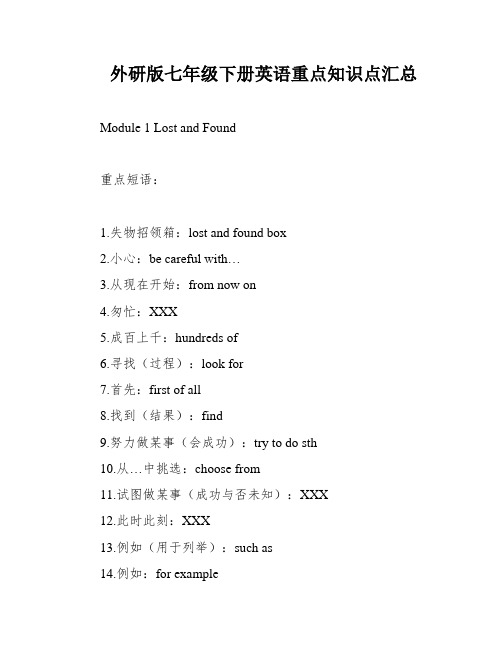
外研版七年级下册英语重点知识点汇总Module 1 Lost and Found重点短语:1.失物招领箱:lost and found box2.小心:be careful with…3.从现在开始:from now on4.匆忙:XXX5.成百上千:hundreds of6.寻找(过程):look for7.首先:first of all8.找到(结果):find9.努力做某事(会成功):try to do sth10.从…中挑选:choose from11.试图做某事(成功与否未知):XXX12.此时此刻:XXX13.例如(用于列举):such as14.例如:for example重点句型:1.这是谁的 (XXX)2.帮助某人做某事:help sb do XXX.3.请小心保管…:XXX…4.欢迎来到…:e to +地点5.给某人打call sb at +电话号码语法总结:物主代词:表示所属关系的代词(…属于谁的)单数:人称形容词性物主代词名词性物主代词第一人称 my XXX第二人称 your yours第三人称 his hers its复数形容词性物主代名词性物主代第一人称 our ours第二人称 your yours第三人称 their theirs形容词性物主代词:必须和名词在一起,例如XXX,your XXX…名词性物主代词:相当于与之相对应的形容词性物主代词+名词,例如XXX.Module 2 What Can You Do?重点短语:1.与某人相处融洽:get on well with sb.2.弹钢琴:play the piano3.打乒乓球:play table XXX4.…怎么样?=how about…。
what about…5.担心…:XXX…6.擅长做某事:be good at doing sth.7.放风筝:fly a kite重点句型:无语法总结:无2.high-tech高科技的3.XXX虚拟现实4.XXX机器人仆人5.XXX太空旅行6.XXX可再生能源7.self-driving cars自动驾驶汽车8.ic engineering基因工程9.XXX寿命10.artificial intelligence人工智能重点句型】1.In the future。
新外研版初一英语下册各单元语法总练习(答案)

七年级下册重点语法Module1语法:名词性物主代词肯定句结构:主语+can+动词原形+其他.否定句结构:主语+can’t(cannot)+动词原形+其他.一般疑问句:把can提前肯定回答:Yes,主语+can.否定回答:No,主语+can’t.一、用can,can’t填空1.What______youdo?Icanliftthisbox,butI______liftthatheavychair.2.______hereadChinese?——No,he______readChinese,buthe______readEnglish.3.______youstandinfrontofthedoor?ThenI______seeyou.4.______Pennywashthedishes?Yes,she______.5.I______seesomespoons,butI______seeanyknives.6.______acatdrinkmilk?Yes,it______.1.表示计划到某地去,谓语动词go与going重复,一般只说begoingto+地点..2.begoingto表示自己打算做某事,计划做某事或有意做某事3.will则表示对未来的猜测一、单项选择()1.There__________ameetingtomorrowafternoon.A.willbegoingtoB.willgoingtobeC.isgoingtobeD.willgotobe()2.Charlie________herenextmonth.A.isn'tworkingB.doesn'tworkingC.isn'tgoingtoworkingD.won'twork()3.He________verybusythisweek,he________freenextweek.A.willbe;isB.is;isC.willbe;willbeD.is;willbe()4.There________adolphinshowinthezootomorrowevening.A.wasB.isgoingtohaveC.willhaveD.isgoingtobe()5.-_____you______freetomorrow?-No.I_____freethedayaftertomorrow.(leave).-What______you____________(do)afteryou_________(leave)here?-I___________(return)homeand___________(get)ajob.3.I______(be)tired.I_____________(go)tobedearlytonight.4.Mary'sbirthdayisnextMonday,hermother_______________(give)herapresent.5.Itisverycoldthesedays.It______________(snow)soon.6.-_______you__________(be)herethisSaturday?-No.I___________(visit)myteacher.7.-____________I______________(get)youacopyoftoday'snewspaper?-Thankyou.8.Iamafraidthere____________(be)ameetingthisafternoon.Ican'tjoinyou.9.Mike______________(believe,not)thisuntilhe_________(see)itwithhisowneyes.10.Mostofusdon'tthinktheirteam_____________(win).Module5语法:特殊疑问句(相当于特殊疑问词加一般疑问句)一whattime,whatcolor,whatday,what填空。
新外研版七年级英语下册(全套)知识点汇总语法知识汇总

(共12套73页)新外研版七年级英语下册(全册)知识点汇总语法知识汇总Module 1 Lost and found语法精选1. whose 谁的whose意为“谁的”, 是表示所有关系的疑问词。
其用法如下:(1)可以用来对名词所有格或形容词性物主代词进行提问。
如:This is Tina’s/her hat.→Whose hat is this?(2)可以用来对名词性物主代词进行提问。
如:These pencils are mine.→Whose are these pencils?2. hundred与hundreds ofhundred是一个确数, 表示“一百”;hundreds of是一个概数, 表示“好几百的;许许多多的”。
当 hundred前面有一个具体的数词时, hundred不变为复数。
如:①two hundred cows两百头奶牛②Hundreds of people come here ev ery day.每天都有许多人到这里来。
注意:当hundred与of连用时, 它后面的名词和它本身都用复数。
如:hundreds of cows 几百头奶牛3. such as 比如;例如such as意为“比如;例如”, 用于引出多个例子。
如:I like some animals such as lions and monkeys. 我喜欢一些动物, 比如狮子和猴子。
注意:for example也意为“比如;例如”, 用来举例说明某一论点或情况, 一般只举同类人或物中的“一个”为例, 作插入语, 可位于句首、句中或句末。
如:①For example, air is invisible.例如, 空气是看不见的。
②He, for example, is a good student.例如, 他就是个好学生。
③Many boys like playing basketball. Take me, for example.许多男孩喜欢打篮球。
最新外研版英语七年级下语法总复习PPT课件

选择问句 Did you live here or there?
特殊疑问句 What did they learn just now?
感叹句 What a heavy rain it is!
一般疑问句 Does Tom speak French?
否定句 I don’t understand it.
祈使句
What time is it?
What time is it by your watch?
___________________________ _______________________
3.提问日期: What’s the date today? What was the date yesterday?
无人称、动词开头, 带命令色彩的句子。
肯 Open the window, please. 定 Look at here. 式 Please read after me.
否 Don’t open the window. 定 Don’t look at here. 式
Don’t read after me.
称单数 +动词原形
+?
过去式
在主语后+didn’t 句前+Did+动词原形+? +动词原形 ___________________________
_______________________
回答:
Can you ...? Yes, I can.
No, I can’t.
Is he...?
Yes, he is. No, he isn’t.
Were they...? Yes, they were. No, they weren’t.
Should you...? Yes, I should. No, ___________________________ I shouldn’t. _______________________
外研版初一下英语课本全梳理(M4—M6)

外研版初一下英语课本全梳理(M4—M6)Module 4 Life in the future【短语归纳】1. in the future 将来2. study at home 在家学习3. in 20 year’s time 20年之后4. on the Internet 在网络上5. be able to 能、会6. free time 空闲时间7. come true 实现8. all year﹙around﹚整年9. as well 也﹙肯定句句末,前面无逗号﹚10. not… any more 不再…11. by email 通过电子12. ask a question 问问题13. the change of weather 天气的变化14. do light and easy work 做轻松简单的工作【重点句型结构】1. be able to +动词原形能/会做...2. not … any more 不再...Tony doesn′t play football any more.托尼不再踢球了。
3.not only…but also… 不仅…而且…Not only me but also he likes English. 不仅我他也喜欢英语。
(动词的形式与but also之后名词的数保持一致)【语法专项】一般将来时﹙Ⅱ﹚由shall和will引导的一般将来时1.含义:将会…2. 特点:助动词shall和will没有人称和数的变化,之后要加动词原形。
shall在一般将来时中,一般用于第一人称之后。
例如:I/We shall have an English lesson.我们将有一节英语课。
3.否定形式:shall not=shan′t will not=won′tModule 5 Shopping 【短语归纳】1. on Mother′s Day 在母亲节这一天2. what colour/color 什么颜色3. What about…? ...怎么样?4. try on 试穿5. look at… 看...6.too much 太多...(修饰不可数名词)7. wait a minute 等一会儿8. half price 半价9. pay for 为...付钱10. a few days later 几天后11. the price of… ...的价格12. one day 一天13. at any time 随时14. one of them 他们中的一个15. be able to 能/会...16. because of… 因为...17. online shopping 网络购物【重点句型结构】1.What′s the price of…? ...的价格是多少?2.buy sb sth. =buy sth for sb. 给某人买某物3.one of the+形容词最高级+可数名词复数最...之一one of the most famous writers 最著名的作家之一。
外研版七年级英语下册期末复习:语法运用
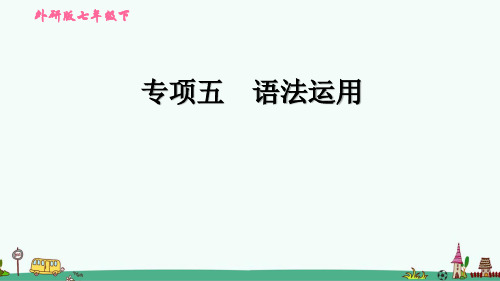
A. How B. Why C. When D. Where
语法运用
13. [2019·天水] Most of the villagers took part in the Dragon
语法运用
2. [2019·随州] —Excuse me, may I use your dictionary?
___D__ is at home.
— Certainly. But remember to return it on time.
A. I
B. Me
C. My
D. Mine
语法运用
3. [2018·抚顺] We have only one position left, so __C___
of you can get it.
A. neither B. both
C. either D. none
【点拨】考查代词辨析。由上文“我们仅剩一个位 置”可知应为“你们两个中的一人可以得到它”。 neither二者都不; both二者都; either二者中的任何 一个; none没有一个。故选C。
B. Need; mustn’t
C. Must; needn’t
D. Could; mustn’t
语法运用
10. [2018·本溪]— Joe, __C___ do you clean your house?
— Three times a week.
A. how long
B. how much
C. how often
外研版英语七年级下册知识点总结
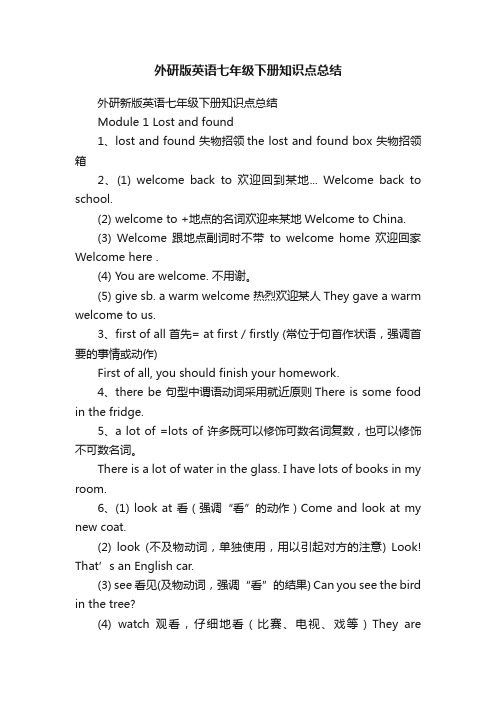
外研版英语七年级下册知识点总结外研新版英语七年级下册知识点总结Module 1 Lost and found1、lost and found 失物招领the lost and found box 失物招领箱2、(1) welcome back to 欢迎回到某地... Welcome back to school.(2) welcome to +地点的名词欢迎来某地Welcome to China.(3) Welcome 跟地点副词时不带to welcome home 欢迎回家Welcome here .(4) You are welcome. 不用谢。
(5) give sb. a warm welcome 热烈欢迎某人They gave a warm welcome to us.3、first of all 首先= at first / firstly (常位于句首作状语,强调首要的事情或动作)First of all, you should finish your homework.4、there be 句型中谓语动词采用就近原则There is some food in the fridge.5、a lot of =lots of 许多既可以修饰可数名词复数,也可以修饰不可数名词。
There is a lot of water in the glass. I have lots of books in my room.6、(1) look at 看(强调“看”的动作)Come and look at my new coat.(2) look (不及物动词,单独使用,用以引起对方的注意) Look! That’s an English car.(3) see 看见(及物动词,强调“看”的结果) Can you see the bird in the tree?(4) watch 观看,仔细地看(比赛、电视、戏等)They arewatching TV now.(5) read 看(书、报纸、杂志等) My mother is reading a book /a magazine /a newspaper.7、everyone/everybody 做主语,谓语动词用单数形式。
外研版七年级英语英语(下册)知识点归纳

外研版七年级英语英语(下册)知识点归纳路漫漫其修远兮,吾将上下而求索。
第一模块:本模块主要介绍了一些常用短语和句型结构。
其中包括“失物招领箱”、“小心保管”、“从现在开始”、“首先”、“寻找”、“找到”、“努力做某事”、“从…中挑选”、“例如”等。
此外,还介绍了一些常用的语法专项,如物主代词的单数和复数形式等。
第二模块:本模块主要介绍了一些与爱好和运动相关的短语和句型结构。
其中包括“与某人相处融洽”、“弹钢琴”、“打乒乓球”、“担心”、“擅长做某事”、“放风筝”等。
此外,还介绍了一些常用的句型结构,如“做…怎么样”、“愿意做某事”、“承诺做某事”等。
改写建议:第一模块:这一模块介绍了一些常用的短语和句型结构,例如失物招领箱、小心保管、从现在开始、首先、寻找、找到、努力做某事、从…中挑选、例如等。
此外,还介绍了一些常用的语法专项,比如物主代词的单数和复数形式等。
第二模块:这一模块介绍了一些与爱好和运动相关的短语和句型结构,例如与某人相处融洽、弹钢琴、打乒乓球、担心、擅长做某事、放风筝等。
此外,还介绍了一些常用的句型结构,比如做…怎么样、愿意做某事、承诺做某事等。
The journey is long and arduous。
but I will XXX。
In terms of grammar。
it is XXX of using "your"。
"his"。
"her"。
or "its"。
it is best to use specific names or XXX。
Moving on to Module 3.some useful phrases include "have a ic"。
"check one's email"。
and "go over"。
外研版七年级下学期英语语法总结
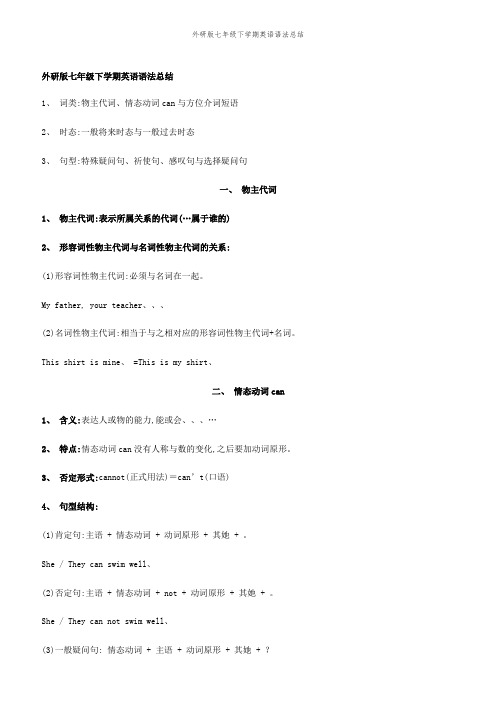
外研版七年级下学期英语语法总结1、词类:物主代词、情态动词can与方位介词短语2、时态:一般将来时态与一般过去时态3、句型:特殊疑问句、祈使句、感叹句与选择疑问句一、物主代词1、物主代词:表示所属关系的代词(…属于谁的)2、形容词性物主代词与名词性物主代词的关系:(1)形容词性物主代词:必须与名词在一起。
My father, your teacher、、、(2)名词性物主代词:相当于与之相对应的形容词性物主代词+名词。
This shirt is mine、 =This is my shirt、二、情态动词can1、含义:表达人或物的能力,能或会、、、…2、特点:情态动词can没有人称与数的变化,之后要加动词原形。
3、否定形式:cannot(正式用法)=can’t(口语)4、句型结构:(1)肯定句:主语 + 情态动词 + 动词原形 + 其她 + 。
She / They can swim well、(2)否定句:主语 + 情态动词 + not + 动词原形 + 其她 + 。
She / They can not swim well、(3)一般疑问句: 情态动词 + 主语 + 动词原形 + 其她 + ?Can she / they swim well?Yes, she / they can、 / No, she / they can’t、(4)特殊疑问句: 特殊疑问词 + 情态动词 + 主语 + 动词原形 + 其她 + ?Why can she / they swim well?Who can swim well?三、介词between、、、and、、、在两者之间Lingling sits between Tony and Daming、玲玲坐在托尼与大明之间。
among 在三者或三者以上之间Miss Li is among lots of students、李老师在许多同学之间。
四、一般将来时1、时间状语:in+一段时间;tomorrow;in the future; next+时间;this+时间(表示将来时间的状语)2、 be(is,am、are) going to do的用法。
(完整版)外研版七年级英语下册知识点归纳及练习,推荐文档

疑问 Am I writing a letter? Is she/he listeningto music?
We are enjoying our trip.
We aren’t enjoying our trip.
Are we enjoying our trip?
They are talking to each other.
(listen ) tomusic.
9. It’s 5 o’clock now. We
(have)supper now
10.
Helen
(wash )clothes? Yes ,she is
2、句型转换: 1 They are doing housework .(分别改成一般疑问句和否定句) 2 The students are cleaning the classroom . ( 改一般疑问句并作肯定和否定回答)
规则 一般情况下,动词后直接加-ing 以不发音的 e 结尾的动词,去掉 e,再加-ing 以辅音字母+元音字母+辅音字母结尾的重 读闭音节,双写末尾辅音字母,然后加-ing
特殊变化 4、 现在进行时的否定和疑问形式结构
示例 working, buying, visiting, talking, saying taking, having, leaving, driving, writing
外研版初一下英语语法总结
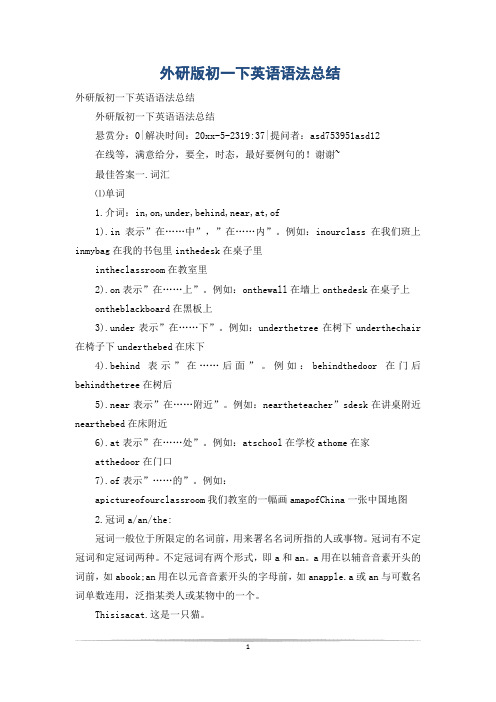
外研版初一下英语语法总结外研版初一下英语语法总结外研版初一下英语语法总结悬赏分:0|解决时间:20xx-5-2319:37|提问者:asd753951asd12在线等,满意给分,要全,时态,最好要例句的!谢谢~最佳答案一.词汇⑴单词1.介词:in,on,under,behind,near,at,of1).in表示”在……中”,”在……内”。
例如:inourclass在我们班上inmybag在我的书包里inthedesk在桌子里intheclassroom在教室里2).on表示”在……上”。
例如:onthewall在墙上onthedesk在桌子上 ontheblackboard在黑板上3).under表示”在……下”。
例如:underthetree在树下underthechair 在椅子下underthebed在床下4).behind表示”在……后面”。
例如:behindthedoor在门后behindthetree在树后5).near表示”在……附近”。
例如:neartheteacher”sdesk在讲桌附近nearthebed在床附近6).at表示”在……处”。
例如:atschool在学校athome在家atthedoor在门口7).of表示”……的”。
例如:apictureofourclassroom我们教室的一幅画amapofChina一张中国地图2.冠词a/an/the:冠词一般位于所限定的名词前,用来署名名词所指的人或事物。
冠词有不定冠词和定冠词两种。
不定冠词有两个形式,即a和an。
a用在以辅音音素开头的词前,如abook;an用在以元音音素开头的字母前,如anapple.a或an与可数名词单数连用,泛指某类人或某物中的一个。
Thisisacat.这是一只猫。
It”sanEnglishbook.这是一本英语书。
Hisfatherisaworker.他的爸爸是个工人。
the既可以用在可数名词前,也可以用在不可数名词前,表示某个或某些特定的人或事物,也可以指上文提到过的人或事物。
完整)外研版七年级下册英语语法专题复习(含练习)

完整)外研版七年级下册英语语法专题复习(含练习)YOUWIN n的初中英语内部资料为外研版七年级下册的重点知识点梳理。
以下是该资料中的语法知识点。
1.词类:物主代词、情态动词can和方位介词短语。
2.时态:一般将来时态和一般过去时态。
3.句型:特殊疑问句、祈使句、感叹句和选择疑问句。
在物主代词方面,单数包括第一人称、第二人称和第三人称。
形容词性物主代词必须和名词在一起,如my father、your teacher。
名词性物主代词相当于与之相对应的形容词性物主代词和名词的组合,如this shirt is mine,相当于this is my shirt。
在复数方面,形容性物主代词包括our、your和their,名词性物主代词包括ours、yours和theirs。
而词类方面,包括mine、yours、his、hers和its,形容词性物主代词包括my、your、his、her和its。
练题包括选择题和填空题,以检验学生对物主代词的掌握程度。
11.Mrs。
Green is my teacher。
I am her student.12.That's a cat。
Its name is Mimi.1.Mr。
Yang is our teacher。
He is from Beijing。
He teaches us English.2.Look。
there is a cat。
It is Lily's。
Its name is Mimi.3.Let me tell her about my life at school.4.This is their room。
Where is ours?5.Don't use the eraser。
It is mine.6.The lady under the tree is my aunt。
She often sings with her husband.Can is a modal verb that expresses ability or possibility。
外研版英语七年级下册期末语法专题(无答案,表格式)
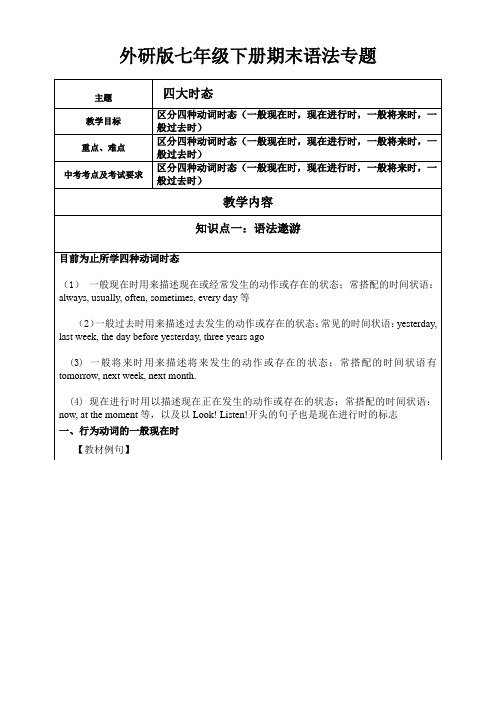
以“辅音字母加o”结尾的加-es
go, do
goes, does
以“辅音字母+y”结尾的,先变y为i,再加-es
carry
fly
carries
flies
特殊变化
be
have
is
has
二、现在进行时
(一)【教材例句】
①I’m standing on the Great Wall of China and talking to you.
Will可用于各种人称,无人称和数的变化。
Will not缩写为won't.
There will be cities on themoon inthe future.
未来月球上会有城市。
Students willusetheInternetto learn.
学生们将利用互联网来学习。
2.肯定句结构:主语+will+动词原形+其他
否定句结构;主语+will+not+动词原形+其他
一般疑问句结构:will+主语+动词原形+其他?
特殊疑问句结构:疑问词(组)+will+主语+动词原形+其他?
She will beourEnglish teacher nextterm.
下学期她将成为我们的英语老师。
I won't be able to come to dinner today.
说明:以ie结尾的动词变动词-ing形式时,要把ie变为y,再加-ing。
如:die - dying, lie - lying, tie - tying等。
外研版七年级英语下册期末复习资料(全)

外研版七年级英语下册期末复习资料(全) Module 1Phrases:1.Lost and found box - a box for lost and found items2.Be careful with… - be us with…3.From now on - starting now4.(Be) in a hurry - in a rush5.Hundreds of - many。
numerous6.Look for - search for7.First of all - firstly8.Find - discover。
locate9.Try to do sth - attempt to do something10.Choose from - select from11.Try doing sth - attempt to do something12.At the moment - currently13.Such as - for example14.For example - as an nKey XXX structures:1.Whose + noun + is this。
- Whose… is this?2.Help sb do sth - assist XXX3.Please be careful with… - please handle with care…4.e to + n - e to…5.Call sb at + phone number - dial… to call someone Grammar focus:Possessive pronouns: XXXSingular:PersonAdjective possessive pronoun1st personmy2nd personyour3rd personhis/her/itsNoun possessive pronounXXXyourshis/hers/itsPlural:Noun possessive pronounoursyoursXXXAdjective and noun possessive pronouns:Adjective possessive pronoun: must be used with a noun。
外研版七年级英语下册语法总结

外研版七年级英语下册语法总结一.一般现在时1. 构成:主语+动词+其他2. 标志词:always, usually, often, sometimes, never, 等频率副词。
3. 否定句:1)当动词是 be, can, may, must, should等在其后加notEg. I can’t play football.2)当是实义动词时加助动词don’t/doesn’t后跟动词原形Eg. I don’t like football.She doesn’t like football.4. 疑问句:1)当动词是 be, can, may, must, should等将其提前Eg. Can you swim?2)当是实义动词时将助动词do/does 放在前面,后跟主语和动词原形。
Eg. Does she like football?5. 特殊疑问句:特殊疑问词+一般疑问句二.现在进行时1. 构成:主语+be+doing+其他2. 动词→动词-ing变化规律:1)一般情况下直接加-ing, eg. Working2)以不发音e结尾的去e加-ing, eg. Taking3)以辅音字母+元音字母+辅音字母结尾的重读闭音节,双写末尾辅音字母加-ing, eg. Stopping4)特殊变化, lie—lying3. 标志词:look, listen, now, at the moment, it’s…o’clock…4. 否定句:be动词后加notEg. She is not listening to music.5. 疑问句:将be动词提前Eg . Is she listening to music?6. 特殊疑问句:特殊疑问词+一般疑问句三.将来时1. 构成:主语+be going to+动词原形will2. 标志词:tomorrow, next day/month/year等表示将来的时间3. 否定句:be动词后加not;will后加notEg. He is not going to have a piano lesson this weekend.He will not have a piano lesson this weekend.4. 疑问句:将be动词提前;将will提前Eg. Is he going to have a piano lesson this weekend?Will he going to have a piano lesson this weekend?5. 特殊疑问句:特殊疑问词+一般疑问句四.过去时1. 构成:主语+动词过去时+其他2. 标志词:yesterday, just now, …ago, this morning, when I was young,last…等3. 动词→动词过去式变化规律:1)一般动词结尾加-ed, eg. Walk--walked2)以字母e结尾的动词加- d, eg. Live--lived3)以辅音字母加y结尾的变y为i加-ed, eg. Hurry—hurried4)以辅音字母+元音字母+辅音字母结尾的重读闭音节,双写末尾辅音字母加-ed, eg. Stop –stopped特殊变化详见课本P1724. 否定句:1)动词be过去式后直接加notEg. I was not in Chengdu last year.2) 当是实义动词时,加助动词didn’t后跟动词原形Eg. I didn’t telephone my parents yesterday.5. 疑问句:1) 动词be过去式提前Eg. Were you in Chengdu last year?2) 当是实义动词时将助动词did 放在前面,后跟主语和动词原形Eg. Did you telephone my parents yesterday?6. 特殊疑问句:特殊疑问词+一般疑问句五.形容词、副词比较级,最高级1. 形容词(1)在句子中做定语,一般放在名词之前。
外研版初一英语语法知识点总结复习

初一英语语法知识点总结复习课时一教学任务一、重点语法1.动词be(am,is,are)的用法:be动词包括“am”, “is”, “are”三种形式。
①第一人称单数(I)配合am来用。
句型解析析:I am+…例句:I am Snoopy.I am ten years old.I am a student.I am a boy.②第二人称(You)配合are使用。
句型解析:You are+…例句:You are my good friend.You are a good teacher.You are beautiful③第三人称单数(He or She or It)配合is使用。
句型解析:She(He, It) is +……例句:She is a good girl.She is so tall.She is short.④人称复数 (we /you/they)配合are使用。
句型解析:We (You, They) are +……例句 We are in Class 5,Grade 7.They are my friends.You are good students.用法口诀:我(I)用am, 你(you)用are,is跟着他(he),她(she),它(it)。
单数名词用is,复数名词全用are。
变否定,更容易,be后not加上去。
变疑问,往前提,句末问号莫丢弃。
还有一条须注意,句首大写莫忘记。
对应练习:一. 用括号中适当的词填空。
1. I ________(am, are, is) from Australia.2. She _______ (am, are, is) a student.3. Jane and Tom _________(am, is, are) my friends.4. My parents _______ (am, is, are) very busy every day.5. _______ (Are, Is, Do, Does) there a Chinese school in New York6. _______ (Be, Are, Were, Was) they excited when he heard the news7. There _____ (be) some glasses on it.8. If he _____ (be) free tomorrow, he will go with us.一、用be 动词的适当形式填空1. I ______ a boy. ______ you a boy No, I _____ not.2. The girl______ Jack's sister.3. The dog _______ tall and fat.4. The man with big eyes _______ a teacher.5. ______ your brother in the classroom6. Where _____ your mother She ______ at home.7. How _______ your father8. Mike and Liu Tao ______ at school.9. Whose dress ______ this10. Whose socks ______ they11. That ______ my red skirt.12. Who ______ Ijeans ______ on the desk.______ a scarf for you.15. Here ______ some sweaters for you.16. The black gloves ______ for Su Yang.17. This pair of gloves ______ for Yang Ling.18. The two cups of milk _____ for me.19. Some tea ______ in the glass.20. Gao shan's shirt _______ over there.第二课时(1)英语人称代词和物主代词一、人称代词表示“我”、“你”、“他”、“她”、“它”、“我们”、“你们”、“他们”的词,叫做人称代词。
- 1、下载文档前请自行甄别文档内容的完整性,平台不提供额外的编辑、内容补充、找答案等附加服务。
- 2、"仅部分预览"的文档,不可在线预览部分如存在完整性等问题,可反馈申请退款(可完整预览的文档不适用该条件!)。
- 3、如文档侵犯您的权益,请联系客服反馈,我们会尽快为您处理(人工客服工作时间:9:00-18:30)。
五、词类
1. 动词
6. 形容词、副词
2. 系动词 7.数词
3. 代词
8. 频率副词
4.不定代词 9. 介词
5. 连词
10. 疑问词
1.动词 (谓语)
He watches TV every day.
He is watching TV now.
He watched TV a moment ago.
4. 提问星期几: What day is it today? What day was yesterday?
5.提问某人的生日:
When is one’s birthday?
6. 提问天气:
What is the weather like today? (How is the weather today?) What was the weather yesterday? (How was the weather yesterday?
medicine three times a day.
• Drink more water and stay in
bed for a few days.
• It’s nothing serious. You’ll
be / get / become OK / well
soon/ in one or two days.
13.谈论健康问题: 1) 用英文叙述自己的病症
have a fever have a cold have a pain here have a headache have a sore through have a stomachache...
2) 就此病症提出合理建议
• Take / Have some / these
7.提问温度:
What’s today’s temperature?
How about the temperature?
8. 提问人的相貌:
What does...look like?
9. 提问人的性格:
What is ... like?
10.询问对方情况:
What’s wrong with...sb.? What’s the matter with ...sb.?
四、句型 (及交际用语)
1.某人用多长时间做某事: It takes/took sb. + time + to do sth.
2. 提问时间: What’s the time? What time is it? What time is it by your watch?
3.提问日期: What’s the date today? What was the date yesterday?
11. 到该做什么事的时候了。
It’s time to do sth. It’s time for sth.
12. 提建议用语:
Why not do sth.? Why don’t you do sth.? What about sth. / doing sth.? It’s best to do sth. You’d better do sth.
动词
否定句
一般疑问句
原形 在主语后+don’t 句前+Do +?
第三人 在主语后+
句前+ Does +动词原形
称单数 doesn’t+动词原 +?
形
过去式 在主语后+
句前+Did+动词原形+?
回答:
Can you ...? Yes, I can.
No, I can’t.
Is he...?
Yes, he is. No, he isn’t.
...ago, this morning,
原形 第三人称单数
be + doing
过去式
When I was young,
否定句、一般疑问句的结构
句中有be、can, may , must, would 的变法
否定句
一般疑问句
只在其后+not (some-any) 将其放到句首...+?
句中没有be、can, may , must, would 的变法
初一第二学期
知识梳理
一、语法
1.动词时态 2.祈使句
动词时态
名称
特征词
肯定句的动词
一般现在 sometimes, usually, often always, every...,
现在进行 look, listen, now, It’s ...(几点了) . 后的句
子
Don’t do sth. 后的句子 一般过去 yesterday..., just now,
式 Don’t look at here.
Don’t read after me.
二、话题
1.天气及季节 2.人的相貌及性格 3.健康 4.假期
三、 句 子
简单句 并列句 复合句 选择问句 特殊疑问句 感叹句 一般疑问句 否定句 祈使句
简单句 This is an orange bike. 并列句 He knows me and I know him. 复合句 When I was 5, I could swim. 选择问句 Did you live here or there? 特殊疑问句 What did they learn just now? 感叹句 What a heavy rain it is! 一般疑问句 Does Tom speak French? 否定句 I don’t understand it. 祈使句 Stand (Don’t) up.
Do you ...? Yes, I do.
No, I don’t.
Does...she ? Yes she does. No, she doesn’t.
Did they...? Yes, they did. No, they didn’t.
Would you...? Yes, I would. No. I wouldn’t.
Were they...? Yes, they were. No, they weren’t.
二、祈使句
无人称、动词开头, 带命令色彩的句子。
肯 Open the window, please. 定 Look at here. 式 Please read after me.
否 定
Don’t open the window.
